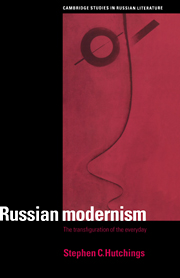Book contents
- Frontmatter
- Contents
- Acknowledgments
- Note on transliteration, citation and translation
- Introduction
- PART ONE
- 1 Narrative and the everyday: myth, image, sign, icon, life
- 2 The development of byt in nineteenth-century Russian literature
- PART TWO
- PART THREE
- Conclusion
- Notes
- Bibliography
- Index
- CAMBRIDGE STUDIES IN RUSSIAN LITERATURE
2 - The development of byt in nineteenth-century Russian literature
Published online by Cambridge University Press: 28 October 2009
- Frontmatter
- Contents
- Acknowledgments
- Note on transliteration, citation and translation
- Introduction
- PART ONE
- 1 Narrative and the everyday: myth, image, sign, icon, life
- 2 The development of byt in nineteenth-century Russian literature
- PART TWO
- PART THREE
- Conclusion
- Notes
- Bibliography
- Index
- CAMBRIDGE STUDIES IN RUSSIAN LITERATURE
Summary
Onegin, following Ghilde Harolde's vice
Fell languidly to pensive ways
Begins his mornings with baths of ice
Then all day at home he stays
(Aleksandr Pushkin)If at Anna Ivanovna's they serve cheese sandwiches, then at Ivan Ivanovich's you get ham, and at Matvei Ionych's every other sandwich will be cheese … And so on for thirty years with no change … Anna Pavlovna putting a sandwich on the table – is that not the limits of fantasy?
(Andrei Belyi)In Russian Literature … reality is constantly provoking moral dissatisfaction with the past and a desire for something better in the future … Russian literature squeezes the present between the past and the future.
(Dmitrii Likhachev)In this chapter I trace the epistemological conflict in Russian culture by examining key moments in what has been called its “counter aesthetic” – the second, reactive stage in a three-stage process by which Russia accommodated itself to western aesthetics. Together these factors account for the negativity with which byt is associated and the positive, self-transformative potential that is the other side of its anti-aesthetic coin. Some of these moments have been analysed in different contexts by other critics (Gary Saul Morson, Irina Paperno, William Mills Todd III) and I draw upon their insights.
The first section begins with a characterization of byt in its modern interpretation, highlighting its associations with triviality, petty intrigue and automatism.
- Type
- Chapter
- Information
- Russian ModernismThe Transfiguration of the Everyday, pp. 44 - 80Publisher: Cambridge University PressPrint publication year: 1997



